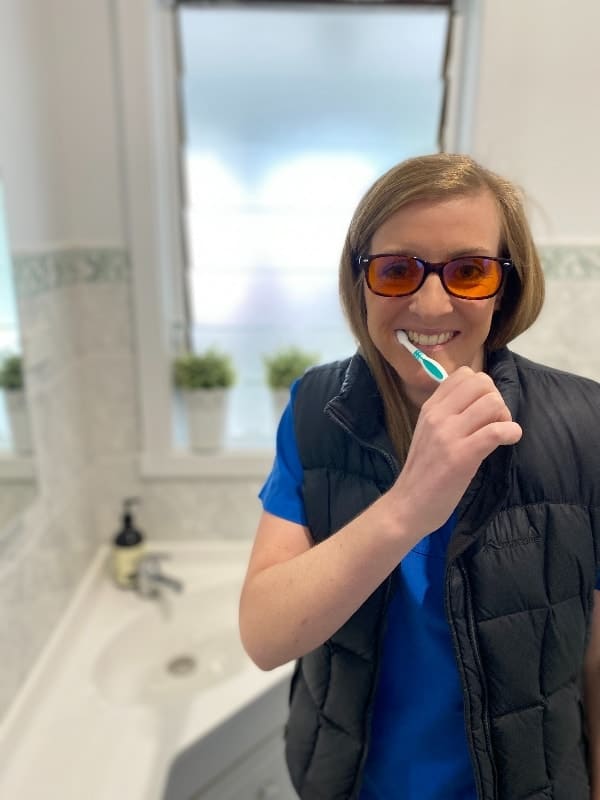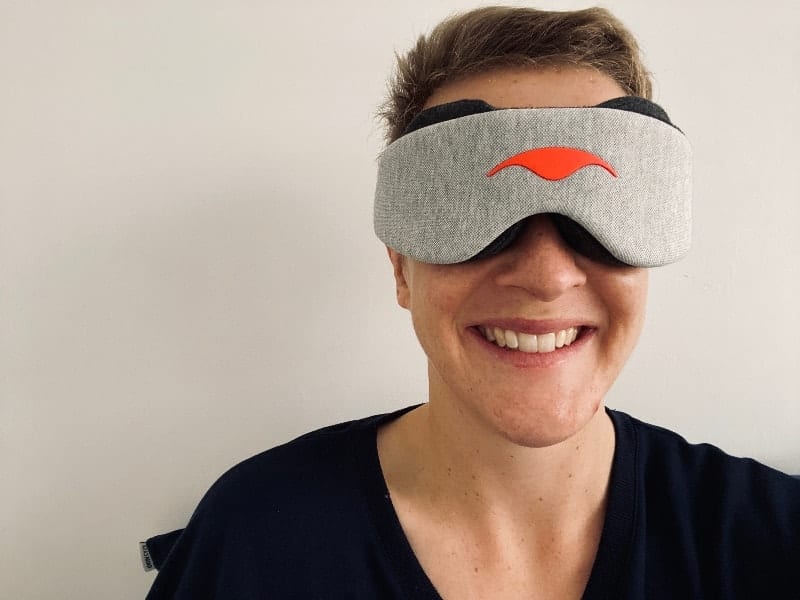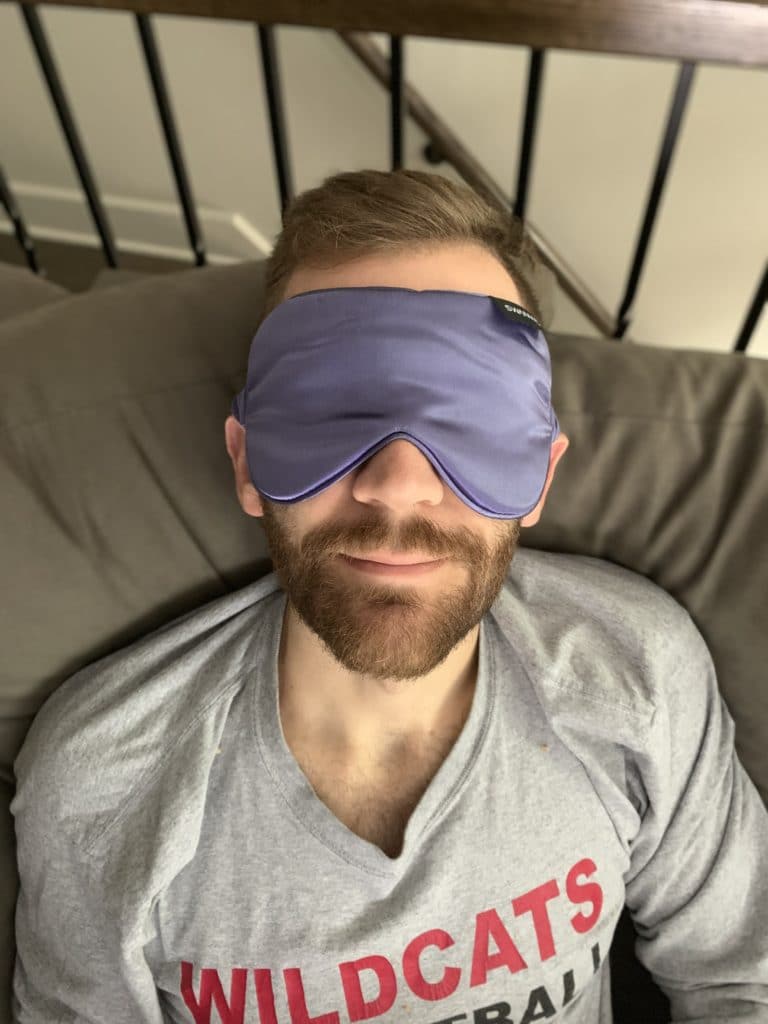Disclosure: This page may contain affiliate links, meaning we receive a commission if you decide to make a purchase through our links, but this is at no additional cost to you. Please read our disclosure and privacy statement for more info.
We know that sleep professionals, such as the Sleep Foundation, recommend normal adults obtain 7-9 hours of sleep each night for optimal health and reduced risk of chronic disease. But what about night shift workers enduring the tumultuous graveyard shift hours? Can we reduce the number of hours we sleep, but still live a healthy life?
How Much Sleep Do Night Shift Workers Need? Most healthy adult night shift workers, still require the recommended 7-9 hours of sleep despite working non-traditional hours. Though some deem this almost impossible, taking naps, optimizing your sleep environment and considering food/beverage timing are useful strategies to maximize the sleep you do get.

I know what you’re thinking – I can’t sleep for 7-9 hours whilst on night shift. Throughout this post, we are going to explore why night shift workers still require the same amount of sleep as everyone else and what you can do to make sleeping this length a reality – even if you’ve “tried everything!”
Night Shift Workers Still Need 7-9 Hours Sleep
Unfortunately, the bodies of night shift workers have not morphed into a special species of human who only require 3-4 hours of sleep, though most of us wish this wasn’t true.
You, along with the 15 million other Americans working night shift, still need 7-9 hours sleep, consistently. But remember, this can be broken up into parts.
I have worked, and still do, with many staff who believe they “only need 3-5 hours sleep per day” and feel fine. While this may feel like a true statement it’s not what our body and brain want. Even if we feel okay after a day or two of limited sleep, such as before your first night shift, it soon catches up with us.
After reading an amazing book “Too Tired to Eat” by Audrey Starkey, this seasoned shift worker for over a decade explains that a lack of sleep impacts everything from our stress levels, ability to sleep and also our appetite hormones – yes, potentially making us fat!
She also links a lack of sleep to a much higher risk of chronic health conditions such as diabetes. I didn’t want to believe this stuff either. But her history of shift work and being a clinically trained nutritionist makes her points all to real. Listen to Audra’s podcast below.
Risks of Not Obtaining Enough Sleep When Working Nights
How do you perform both at home and at work when you’re sleep-deprived. I know I’m short-tempered, have difficulty concentrating and make a ton of mistakes.
Here are some of the other risks when not obtaining enough sleep as a night shift worker:
- Increased fatigue and risk of Shift Work Sleep Disorder (SWSD) (source)
- Increased risk of work-related injuries (source)
- Increased road accidents occurring on the commute home – Rrad How to Stop Falling Asleep Driving After Night Shift
- Increased health issues to those already vulnerable – such as hypertension (high blood pressure), dyslipidemia (high cholesterol) and cardiovascular disease (heart disease) (source)
- Weight gain – yes, not getting enough sleep can make you fat! Read more about the risks of night shift here.
- Digestive issues such as metabolic syndrome
- Type 2 diabetes mellitus (source)
- Certain cancers such as colorectal cancer (source)
I don’t list these consequences to threaten you, though they do scare me! I mention them as a motivating boost you may need to start taking sleep seriously. I know it’s easy to almost give up, accepting that your lack of sleep on nights is just something that happens, but it doesn’t have to be this way.
So next I want to give you some useful tips to start sleeping better during the day. I hope you’re ready to make some positive changes.
I am respectful of night shift workers who suffer from sleep disorders such as insomnia, narcolepsy, restless leg syndrome and sleep apnea, but you may simply have not found your magic solution yet. While I can’t promise you’ll find it here, you just might so please have an open mind.
VIDEO – Are Night Shifts Bad For You? Stop Them Ruining Your Health (You’ll find this video and plenty more night shift related videos on our YouTube channel here.
When To Sleep Before Your First Night Shift
The day before your first night can be tricky to navigate. Should you sleep in? Should you try and mimic the night shift leading up to your first night if possible? Or should you stay awake for 24 hours to make sleeping easy after night 1?
In this post titled, How Long Should You Sleep Before A Night Shift? we talk about how situational this question is due to start times and shift length.
But in short, don’t power through the day before without sleep. Don’t force yourself to stay up for 24+ hours.
According to the Huffington Post, “After 17 to 19 hours without sleep, performance was equivalent or worse than that of a blood alcohol concentration (BAC) level of 0.05 percent”
I like to exercise, clean the house, make some food and then wash the sheets all in preparation for my nights. This normally wears me out so a long nap (around 2-3) is not too difficult.
There are many different methods people use to prepare for their night shift which you can find here. My advice is to find the one which is right for you, not what you think is most popular. But really avoid cramming too much into your day before treating it like a day off. I have been caught out many times and it’s by far not the best method.
VIDEO – Don’t Go Into Your First Ever Night Shift Without This Advice
Naps and Night Shift
Naps are somewhat controversial for night shift workers. Some think it makes them feel worse whilst others cannot get enough.
If you have the luxury to enjoy a nap at work, the key is to make them short and impactful. Between 10-20 minutes will give you a boost for around 3 hours. Set an alarm my friends.
I love naps and wish more night shift workers embraced them. See this post about the power of naps and how you can do it like a pro.
If you’re having trouble getting into the mood for sleep, this video will give you a few pointers.
How Night Shift Workers Can Sleep During The Day
Your sleep routine as a night shift worker will vary greatly from the next night shift worker.
One might have children and the other doesn’t, and one might like to exercise before going to bed whilst the next night shift worker likes to exercise in the afternoon.
I am first to admit that sleeping during the day can be a frustrating task, requiring perseverance. But we can’t give up yet.
Here are a number of strategies we can try in order to achieve restful sleep during the day to prepare us for the night ahead.
Find a Routine and Be Consistent
Our body likes routine. It likes to know what to expect and when. When working nights, try and have a strict bedtime which you can replicate each and every morning (where possible).
For example, if you get home at 8am, try and be in bed between 9-9.30 after you’ve eaten breakfast and had a shower. Don’t meet a friend for coffee, start a new Netflix series or bake a cake. These things can wait.
What about your days off? This is tricky. In this post, we go into great detail about this exact topic. But in short – yes you should stick to the same schedule even when on day shift and on your days off. Inside the post, we do recommend a great method where you can get the best of a both worlds.
“The best sleep schedule for those who work nontraditional hours is one that’s consistent. While that may sound simple, it can take time to train your body and mind to sleep when you are used to being awake”
Sleep.org
Wear Blue Light Blocking Glasses
If you have visited this blog before, you know we are obsessed with these glasses. In fact, I am wearing them right now!
These glasses help your sleep hormones to still be produced despite being in an environment with light, such as the TV, lights and your cell phone. Traditionally, the light sends confusing signals to our brain, causing melatonin to not be produced and making it much more difficult for us to sleep when we do finally hop into bed.
We HIGHLY recommend Swanwick Sleep Blue Light Blocking Glasses. They are high quality, really comfortable and they actaully work which is why we wear them every single night.
It is advised that we should wear these glasses at least 90 minutes before going to bed. Leaving them on whilst getting ready – this includes the time you brush your teeth!
They may look funny – but you’re just at home, right?


Make Sure Your Bedroom Is Conducive For Sleep
Here are five things I want you to think about.
- What temperature is your bedroom?
- How dark/light is your room?
- Do you have bedding and a pillow you love?
- How noisy/quite is your bedroom?
- Does your room smell?
Everything from the light to the comfort of your pillow will impact how well you sleep.
If your room is too hot it’s likely you’ll wake early and have trouble going back to sleep.
If your room is too light those sleep hormones we mentioned earlier will “wake up”, making sleep almost impossible.
If your room is too quiet you may start to hear your own heartbeat and this can be either soothing or distracting depending on how relaxed you feel.
Take a look around your room on your days off as you’ll likely have a clearer mind and consider buying:
- A pair of earplugs – You’ll find the pair we love in here
- Blackout blinds – Blackout your bedroom using these blinds or any others you have found to be effective
- A new matress – this may seem extreme but if your bed is causing backpain and restlessness it could be time for an upgrade. Nolah and Layla Sleep are pretty phenomenal bedding companies well worth a look.
- A new pillow – either re-flush yours by putting it in the dryer if the instructions say you can, or buy one you love. We spend 1/3 of each and every day using it so don’t be afraid to spoil yourself. We love this one, again on our recommended tools page.
- An eye mask – We recommend Manta (which I am wearing below) and Swanwick Sleep Silk Eye Mask (which Dan is wearing)


Eat something before you sleep, but avoid caffeine
In this post titled, What To Eat After Night Shift we discuss foods that can actually help you sleep. Even if you don’t feel like eating, have a mouthful of yogurt, a handful of almonds or a glass of warm milk to prevent you waking with hunger pains.
Here are some other tips to help you sleep during the day:
- Try aromatherapy such as lavender. See our post here and discover which oils we recommend.
- Listen to sleep music while getting ready and when laying in bed – Here are the playlists and specific songs we recommend. This one can take time so patience may be required.
- Workout before you sleep. Though questionable by some night shift workers, others swear by the method to tire them out. Read more about working out after night shift here.
- Drink Green Juice during the shift. We recently found SuperGreen TONIK, a green juice packed with ingredients used to calm, restore and detox all the bad stuff out of our system. This is a natural way your body can start to relax and obtain better sleep. See our review here and if it’s something you could incorporate into your night shift routine.


Like all adults, night shift workers still require 7-9 hours of sleep. We do not have a special allowance. Night shift workers may actually require more sleep because we are working against our body clocks causing all sorts of disharmony.
If you struggle with obtaining this amount of sleep you’re not alone but don’t give up. Don’t be afraid to try something new even if it feels weird in the beginning.
Happy Sleeping. Please let me know in the comments below if you have any other useful sleeping strategies.
Before you go, I highly recommend you check out Audra’s book – “Too Tired to Cook” on Amazon here and also have a look at this post which talks all about sleep trackers.
Cheers,

Disclosure: This page may contain affiliate links, meaning we receive a commission if you decide to make a purchase through our links, but this is at no additional cost to you. Please read our disclosure and privacy statement for more info.
Recent Posts
An examination of the night shift professions, that while sometimes underappreciated, are necessary for civilization, in its current form, to exist. A city can be thought of as a machine. Each...
Culminated from an exhaustive yet well-funded journey into the night, this article will prepare you for life outside of work while being a denizen of the dark. During days off, night shift...

